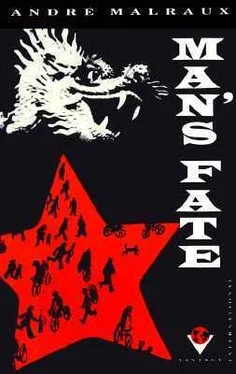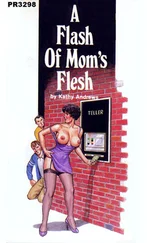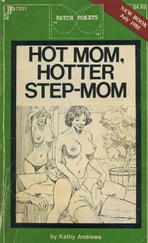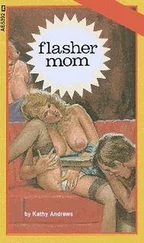“I thank you in the name of my party. The Communists are very treacherous-they are betray-ing us, their faithful allies. It was understood that we would collaborate together, and that the soci-al questi-on would be put forward only when China was united. And already they are putting it forward. They do not respect our contract. They do not want to build up China, but the Soviets. The army’s dead did not die for the Soviets, but for China. The Communists are capable of anything. And that is why I must ask you, Monsieur le Directeur, if the French police would have any objecti-on to thinking of the personal safety of the General.”
It was clear that he had asked the same service of the international police.
“Gladly,” answered Martial. “Send the chief of your police to me. Is it still Konig?”
“Still. Tell me, Monsieur le Directeur: have you studied Roman history?”
“Naturally.”
“At night-school,” thought Ferral.
The. telephone again. Martial took the receiver.
“The bridges have been taken" he said as he put it back. “In a quarter of an hour the insurrection will be occupying the city.”
“My opinion,” the Chinaman went on as if he had not heard, “is that the Roman Empire was destroyed through moral corrupti-on. Don’t you believe that a technical organizati-on of prostituti-on, an occidental organization, like that of the police, would make it possible to get the better of the Hankow chiefs, who are not comparable to those of the Roman Empire?”
“It’s an idea. but I don’t think it’s practical. It requires a good deal of thought. ”
“Europeans never understand anything of China that does not resemble themselves.”
A silence. Ferral was amused. The Chinaman intrigued him: that head thrown back, almost disdainful, and at 106
the same time, that embarrassment. “Hankow flooded by streams of prostitutes. ” he thought. “And he knows the Communists. And the possibility that he may have some knowledge of political economy is not excluded. Astonishing!” While soviets were perhaps being organized in the city, this fellow was dreaming of the artful precepts of the Roman Empire. “Gisors is right, they’re always trying to find tricks.”
Again the telephone:
“The barracks are surrounded” said Martial. “The reenforcements from the government have stopped coming.”
“The North Station?” asked Ferral.
“Not yet taken.”
“Then the government can recall troops from the front?”
“Perhaps, sir,” said the Chinaman; “its troops and tanks are falling back on Nanking. It may send some here. The armored train can still give serious battle.”
“Yes, it will hold its own in the vicinity of the train and the station,” Martial went on. “Everything they have taken is immediately organized; the insurrection surely has Russian or European cadres; the revolutionary employees of each administration guide the insurgents. There is a military committee directing the whole thing. The entire police is disarmed now. The Reds have rallying points, from which the troops are directed against the barracks.”
“The Chinese have a great sense of organization,” said the officer.
“How is Chiang Kai-shek protected?”
“His car is always preceded by that of his personal guard. And we have our secret agents.”
Ferral at last understood the reason for the disdainful angle of the Chinaman’s head, which was beginning to annoy him (at first it had seemed to him that the officer was continually looking over Martial's head at his erotic sketch): a white spot on his right eye obliged the officer to look downward.
“Not enough,” answered Martial. “Have to do something about that. The sooner the better. Now, I have to run along: there's the matter of electing the Executive Committee which will take the government in hand. I may be able to do something there. Also the matter of the election of the prefect, which is not to be overlooked. ”
Ferral and the officer remained alone.
“So, Monsieur,” said the Chinaman, his head back, “from now on we can count on you?”
“Liu Ti Yu is waiting,” he answered.
Chief of the Shanghai Bankers’ Association, honorary president of the Chinese Chamber of Commerce, linked with all the guild-masters, this man was in a position to act in the Chinese city, which the insurgent sections were no doubt beginning to occupy-to act even more effectively than Ferral in the concessions. The officer bowed and took his leave. Ferral went up to the second story. In one corner of a modern office everywhere adorned with sculptures of the best periods of Chinese an, Liu Ti Yu was waiting. He wore a white linen suit over a collarless sweater that was as white as his bristling hair. His hands seemed glued to the nickeled tubes of his armchair. His face was al mouth and jaw-an energetic old frog.
Ferral did not sit do'wn.
“You are determined to have done with the Communists.” He was not asking, he was affirming. “We too, obviously.” He began to walk back and forth, shoulders thrust forward. “Chiang Kai-shek is ready for the break.” Ferral had never encountered suspicion on the face of a Chinaman. Did this fellow believe him? He handed him a box of cigarettes. This box, since he had decided to give up smoking, was always open on his desk, as if the constant sight of it affirmed the strength of his character, confirming him in his decision.
“We have to help Chiang Kai-shek. For you it’s a matter of life or death. We cannot allow the present situation to continue. Behind the army, in the rural districts, the Communists are beginning to organize the peasant Unions. The first decree of the Unions will be the expropriation of the creditors. (Ferra! did not use the word usurers.) An enormous proportion of your capital is invested in the country, the best part of your bank deposits is guaranteed by land. The peasant soviets. ”
“The Communists won’t dare to form soviets in China.”
“Let's not play on words, Mr. Liu. Whether you call them unions or soviets, the Communist organizations are going to nationalize the land, and declare credits illegal. Those two measures wipe out the essential part of the guarantees on the basis of which you have obtained foreign credits. More than a billion dollars, counting my Japanese and American friends. It’s out of the question to offer a paralyzed commerce as a guarantee for this sum. And without even mentioning our credits, those decrees alone are enough to break every bank in China. Obviously.”
“The Kuomintang won’t allow it.”
“There is no Kuomintang. There are the Blues and the Reds. They have gotten along so far-though badly- because Chiang Kai-shek had no money. Once Shanghai is taken-tomorrow-Chiang Kai-shek can almost pay his army with the customs. Not quite. He counts on us. Everywhere the Communists have preached the seizure of lands. It is said that they are trying to put it off: too late. The peasants have heard their speeches, and they are not members of their party. They’ll do as they please.”
“Nothing can stop the peasants, except force. I have already said so to the Consul-General of Great Britain.”
Recognizing almost the tone of his o^ voice in that of his listener, Ferral had the impression that he was winning him over.
“They have already tried to seize lands. Chiang-Kai- shek is determined not to let them. He has given the order that none of the lands belonging to officers or to relatives of officers must be touched. We must. ”
“We are all relatives of officers.” Liu smiled. “Is there a single piece of land in China whose owner is not the relative of an officer?.
Ferral knew the Chinese family relationships.
Again the telephone.
Читать дальше











